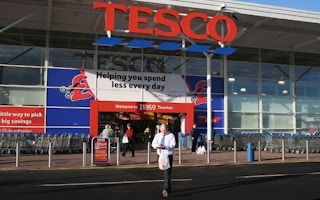Waste is undoubtedly a huge problem here in Britain, and with Theresa May recently pledging to eliminate plastic by 2042. Iceland is one supermarket that is already preparing to make the appropriate changes to get rid of plastic from their branded products — with an aim of doing so before 2023 after 80 per cent of their customers said they would support the change.
To continue reading, subscribe to Eco‑Business.
There's something for everyone. We offer a range of subscription plans.
- Access our stories and receive our Insights Weekly newsletter with the free EB Member plan.
- Unlock unlimited access to our content and archive with EB Circle.
- Publish your content with EB Premium.
But where do supermarkets stand on the greater issue of food waste? We’ve teamed up with waste management experts Reconomy, which has a wide variety of skips for hire that can help your business on any project, to see what supermarkets around the UK are doing to help tackle this problem.
According to the Food Standards Agency, the UK throws away 7 million tonnes of food and drink in the household every year which could be eaten, costing an astonishing £12.5 billion. But what are supermarkets doing to tackle the waste problem? We take a look at some of the main companies making changes.
Tesco
One of the biggest grocery stores in the UK has taken a step in the right direction to help battle the wastage problem our country is facing. With 6,553 stores and serving 50 million shoppers each week, less than 1 per cent of food is wasted, which removes 46,000 tonnes of waste from circulation.
At the end of the day, surplus foods and food that can no longer be sold in store (maybe due to appearance) will then become available for a charity to collect, free of charge, on the FoodCloud app (which Tesco is currently trialling for its stores in Asia). Through this initiative, Tesco has helped provide six million meals to over 3,500 different charities.
Besides the app, no food from Tesco has entered a landfill since 2009 and there are a few ways that it has been able to achieve this. Any baked food that goes unused is transformed into animal feed for livestock. Oils that are left over are converted into bio-diesels and when there are no alternatives, energy is generated by anaerobic digestion and incineration.
Tesco has tried these methods in the UK and across its European stores (Czech Republic, Hungary, Poland, and Slovakia). 400 of them are able to donate food to foodbanks within the local area and have currently donated 14.5 million meals since 2013. By 2020, Tesco has an aim to donate from all of its stores within Europe.
To tackle food waste further, Tesco has announced an agreement with 24 of its largest suppliers to create the Sustainable Development Goal to reduce its food waste by 50 per cent by 2030. Sometimes, produce doesn’t look its conventional state — this has lead this supermarket to create a ‘Perfectly Imperfect’ range to give customers great products at a discounted price.
“
If more supermarkets were to follow suit and help to reduce the amount of waste that they produce, whether this is food waste or plastic usage, the world would see general improvements that could help the environment and safeguard our planet.
Co-Op Food
Being the UK’s fifth biggest food retailer — with over 2,500 stores across the country —Co-Op Food is taking a strong stand on the food waste issue here in Britain. One of the greatest achievements made by this supermarket was that in September 2015, it sent 50 tonnes of food to FareShare (the company that provides the FoodCloud app) which was 10x more than what it gave in September 2014. This enabled
charitable organisations to provide those in need with over 120,000 meals — allowing Co-Op Food to stick to its ‘no waste in landfills’ rule.
Recently, Co-Op Food announced that it will sell food up to a month past its best-before date with hopes to reduce the amount of waste that is being produced. These out-of-date products will be sold for just 10p, and will include tinned goods, pastas and food sealed in packets. However, this does not include items that have a ‘Use by’ date to withhold safety measures — especially with meat and dairy products.
Co-Op Food has said that from this new scheme, it will be able to save over 50,000 items each year that would have went to waste — helping tackle a huge environmental problem.
If more supermarkets were to follow suit and help to reduce the amount of waste that they produce, whether this is food waste or plastic usage, the world would see general improvements that could help the environment and safeguard our planet.
Richard Walker is marketing manager at Reconomy, a UK-based waste management and recycling solutions company.









